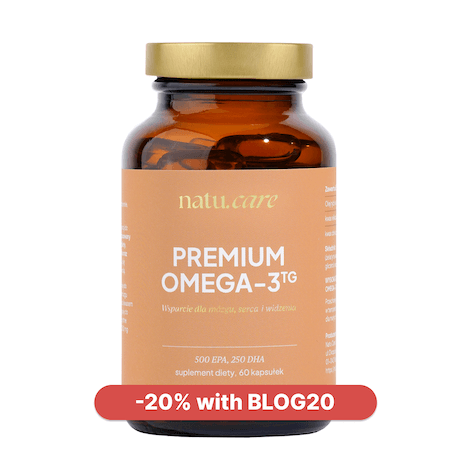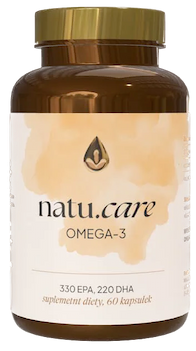- Home
- Omega acids
- Omega-3 fatty acids
Omega-3 fatty acids: properties, types, supplementation
Valuable omega-3 fatty acids (DHA, ALA, EPA) should find a permanent place in your menu.


Learn more about our editorial process
.

Learn more about our editorial process
.

Learn more about our editorial process
.

Learn more about our editorial process
.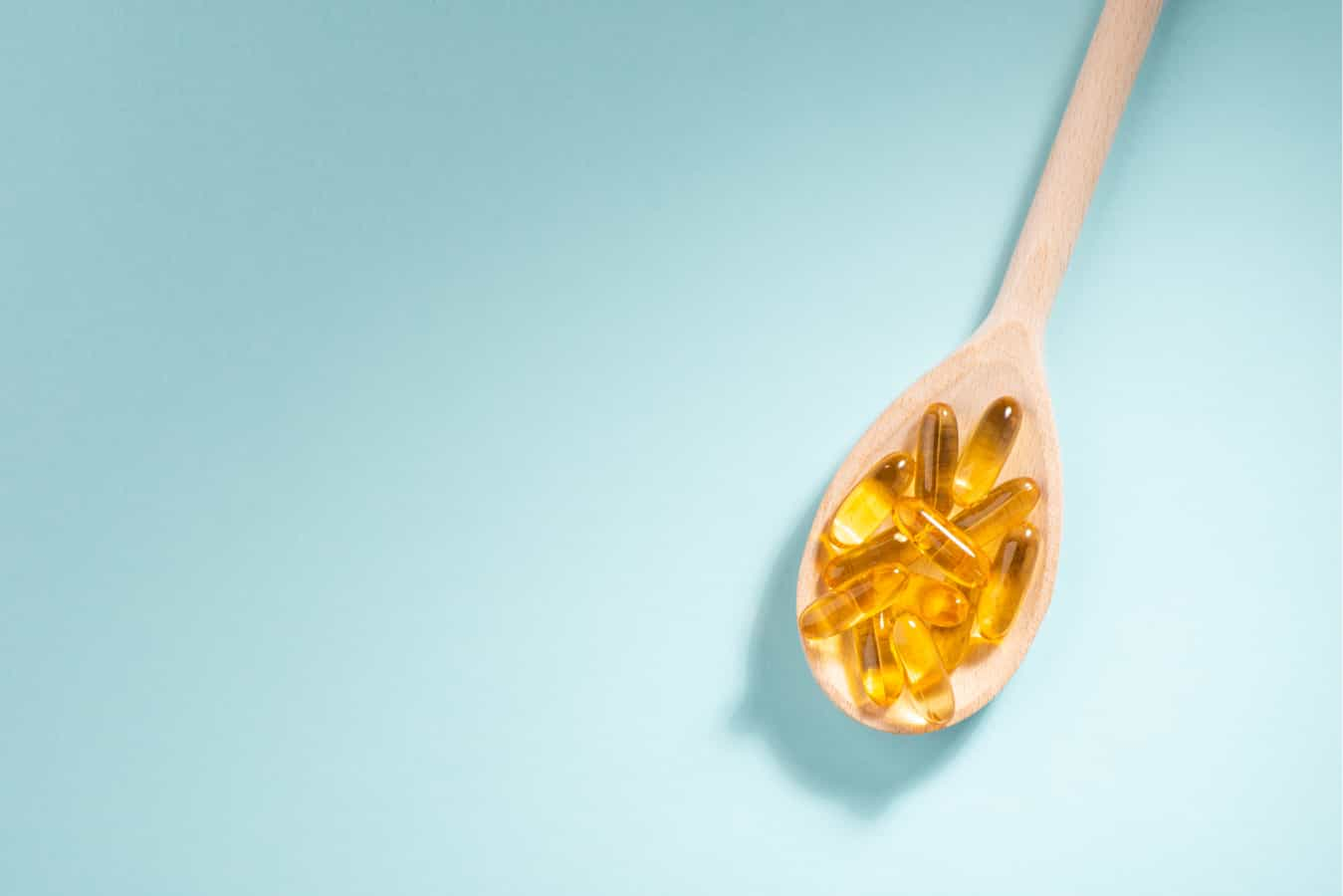
Why you can trust us
Articles on Natu.Care are written based on scientific research, data from government websites and other reliable sources. The texts are written in cooperation with doctors, nutritionists and other health and beauty experts. Articles are reviewed before publication and during significant updates.
.Learn more about our editorial process
.Information about advertisements
Content on Natu.Care may contain links to products from the sale of which we may receive a commission. When creating content, we adhere to high editorial standards and take care to be objective about the products discussed. The presence of affiliate links is not dictated by our partners, and we select the products we review ourselves completely independently.
.Learn more about our terms and Conditions
.The average Norwegian eats around 50 kilograms of fish per year. With such an intake of omega-3 fatty acids, it is no wonder that this is one of the healthiest populations in the world. Great fitness in athletes, good memory and creativity in writers, and that beautiful, healthy skin of Norwegian women - I dare say omega-3 fatty acids have had their fatty fingers in this.
Omega-3 fatty acids are multi-taskers - even at this point they support your focus, keep an eye on your heart health and even influence the appearance of your skin.
All omega-3 acids are absolutely essential for you. Ba - their proportion and diverse sources are also important. You're about to find out what it all goes with and how to bite the topic to stay healthy.
From this article you will learn:
- Why omega-3 fatty acids are essential for health.
- Why omega-3 fatty acids are essential for health.
- What omega-3 fatty acids exist and what they give you. .
- How to provide omega-3s in the ideal proportion. .
- Why omega 3-6-9 supplements are a bad idea. .
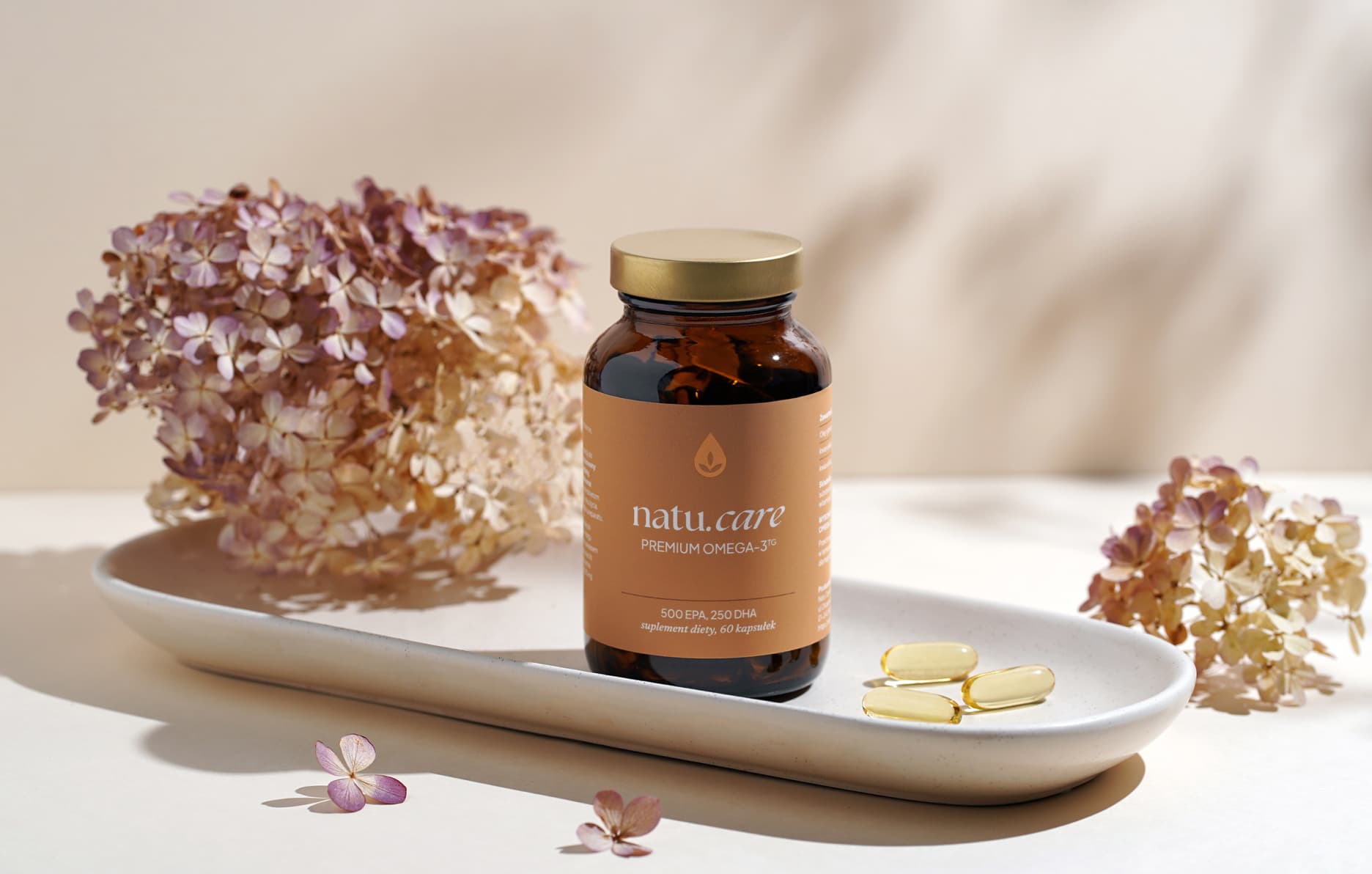
Sprawdź, za co pokochały go tysiące klientek Natu.Care Premium Omega-3ᵀᴳ -15% z kodem BLOG15
Natu.Care Omega-3ᵀᴳ Premium
Natu.Care Omega-3ᵀᴳ Premium dla zdrowia serca, mózgu i odporności. Najlepsza przyswajalność. Optymalna dawka 750 mg. Przebadana przez niezależne laboratorium.
Zobacz więcej
Produkt ma super skład, transparentną etykietę i co dla mnie jest ważne – małe kapsułki do połknięcia. Nie ma też nieprzyjemnego efektu odbijania rybą, który miałam spożywając inne produkty. Widzę znaczną poprawę odporności. Polecam!@Kasia P.
See also:
.- Omega acids
- Omega-6 fatty acids
- Omega-9 fatty acids
- Omega 3-6-9 acids .
- Deficiency of omega-3 fatty acids .
- Omega-3 fatty acids for children .
- EPA acid
- DHA acid .
- ALA acid
- Tran
Omega-3 fatty acids - the good fats
.Omega-3 fatty acids (also known as n-3 or ω-3 for short) are unsaturated fatty acids that support many important systems in the body. Omega-3s are found in a variety of foods, both animal and plant.
The three main types important for humans are: ALA, EPA and DHA. The body cannot make omega-3 fatty acids on its own - they need to be supplied through the diet.
The body can't make omega-3 fatty acids on its own.
Unsaturated fatty acids (of which omega-3s are one) are commonly referred to as 'good fats'. Omega-3s definitely deserve this reputation - they exhibit many health-promoting properties and impressive potential for treating certain conditionsand. Their proper concentration in the body will ensure your physical health, mental health and (let's be vain and whatnot!) good looks.
Product description
The dietary supplement contains omega-3ᵀᴳ, or omega-3 acids in the form of trójglyceridesów. Scientific studies suggest that this form of fatty acidsós up to 2 times better absorbed than the estersós present in many dietary supplements on the market. This means that you are assured of their effectiveness and of supplying yourself with valuable omega acids.
Fatty acids omega-3 are derived from wild anchovy oil. It is a rich source of healthy fats that are essential for the health of the cardiovascular, immune and nervous systems, as well as the proper function of vision, joints muscles.
Scientific research suggests that wild anchovies are a good source of healthy fats.
Scientific research also suggests that an adequate intake of omega-3 fatty acidsós protects against and supports the treatment of depression and anxiety disorders. In addition, omega-3s influence the hydration and appearance of the skinóry and support healthy sleep.
.
The formula contains a total of 750 mg of EPA+DHA acidsós, which is three times higher than the recommended minimum of 250 mg for the Polish population. Omega-3 TG Premium has studies indicating that its TOTOX is 9, which is a very good result.
Supplementation of omega-3 fatty acidsóis recommended for anyone who does not eat 1–2 portions (approximately 300 g) of oily fish per week. Children during growth, seniors, physically active people, vegans and vegetarians, as well as patients undergoing cardiovascular treatment and prevention of heart disease also have an increased need.
Pros and cons
The dietary supplement contains omega-3ᵀᴳ, or omega-3 acids in the form of trójglyceridesów. Scientific studies suggest that this form of fatty acidsós up to 2 times better absorbed than the estersós present in many dietary supplements on the market. This means that you are assured of their effectiveness and of supplying yourself with valuable omega acids.
Fatty acids omega-3 are derived from wild anchovy oil. It is a rich source of healthy fats that are essential for the health of the cardiovascular, immune and nervous systems, as well as the proper function of vision, joints muscles.
Scientific research suggests that wild anchovies are a good source of healthy fats.
Scientific research also suggests that an adequate intake of omega-3 fatty acidsós protects against and supports the treatment of depression and anxiety disorders. In addition, omega-3s influence the hydration and appearance of the skinóry and support healthy sleep.
.
The formula contains a total of 750 mg of EPA+DHA acidsós, which is three times higher than the recommended minimum of 250 mg for the Polish population. Omega-3 TG Premium has studies indicating that its TOTOX is 9, which is a very good result.
Supplementation of omega-3 fatty acidsóis recommended for anyone who does not eat 1–2 portions (approximately 300 g) of oily fish per week. Children during growth, seniors, physically active people, vegans and vegetarians, as well as patients undergoing cardiovascular treatment and prevention of heart disease also have an increased need.
Additional information
The dietary supplement contains omega-3ᵀᴳ, or omega-3 acids in the form of trójglyceridesów. Scientific studies suggest that this form of fatty acidsós up to 2 times better absorbed than the estersós present in many dietary supplements on the market. This means that you are assured of their effectiveness and of supplying yourself with valuable omega acids.
Fatty acids omega-3 are derived from wild anchovy oil. It is a rich source of healthy fats that are essential for the health of the cardiovascular, immune and nervous systems, as well as the proper function of vision, joints muscles.
Scientific research suggests that wild anchovies are a good source of healthy fats.
Scientific research also suggests that an adequate intake of omega-3 fatty acidsós protects against and supports the treatment of depression and anxiety disorders. In addition, omega-3s influence the hydration and appearance of the skinóry and support healthy sleep.
.
The formula contains a total of 750 mg of EPA+DHA acidsós, which is three times higher than the recommended minimum of 250 mg for the Polish population. Omega-3 TG Premium has studies indicating that its TOTOX is 9, which is a very good result.
Supplementation of omega-3 fatty acidsóis recommended for anyone who does not eat 1–2 portions (approximately 300 g) of oily fish per week. Children during growth, seniors, physically active people, vegans and vegetarians, as well as patients undergoing cardiovascular treatment and prevention of heart disease also have an increased need.
Expert opinion
The dietary supplement contains omega-3ᵀᴳ, or omega-3 acids in the form of trójglyceridesów. Scientific studies suggest that this form of fatty acidsós up to 2 times better absorbed than the estersós present in many dietary supplements on the market. This means that you are assured of their effectiveness and of supplying yourself with valuable omega acids.
Fatty acids omega-3 are derived from wild anchovy oil. It is a rich source of healthy fats that are essential for the health of the cardiovascular, immune and nervous systems, as well as the proper function of vision, joints muscles.
Scientific research suggests that wild anchovies are a good source of healthy fats.
Scientific research also suggests that an adequate intake of omega-3 fatty acidsós protects against and supports the treatment of depression and anxiety disorders. In addition, omega-3s influence the hydration and appearance of the skinóry and support healthy sleep.
.
The formula contains a total of 750 mg of EPA+DHA acidsós, which is three times higher than the recommended minimum of 250 mg for the Polish population. Omega-3 TG Premium has studies indicating that its TOTOX is 9, which is a very good result.
Supplementation of omega-3 fatty acidsóis recommended for anyone who does not eat 1–2 portions (approximately 300 g) of oily fish per week. Children during growth, seniors, physically active people, vegans and vegetarians, as well as patients undergoing cardiovascular treatment and prevention of heart disease also have an increased need.
Product description
The dietary supplement contains high-quality fatty acids omega-3 from anchovy oil. It is a naturally rich source of healthy fats that are essential for cardiovascular, immune and nervous system health, as well as proper function of eyesight, joints muscles.
Scientific research also suggests that an adequate intake of omega-3 fatty acidsós protects against and supports the treatment of depression and anxiety disorders. In addition, omega-3s influence the hydration and appearance of the skinóry and support healthy sleep.
.
The dietary supplement contains 550 mg EPA+DHA per daily serving. This is more than double the official recommendations for the Polish population, whichóre suggesting an intake of at least 250 mg per day.
Supplementation of EPA+DHA is a good way to support healthy sleep.
Supplementation with omega-3 fatty acidsós is advisable if you do not consume 1–2 portions (approx. 300 g) of oily fish per week. There is also an increased need for physically active people, vegans and vegetarians, seniors, children during growth spurts and patients undergoing cardiovascular treatment and prevention of heart disease.
Pros and cons
The dietary supplement contains high-quality fatty acids omega-3 from anchovy oil. It is a naturally rich source of healthy fats that are essential for cardiovascular, immune and nervous system health, as well as proper function of eyesight, joints muscles.
Scientific research also suggests that an adequate intake of omega-3 fatty acidsós protects against and supports the treatment of depression and anxiety disorders. In addition, omega-3s influence the hydration and appearance of the skinóry and support healthy sleep.
.
The dietary supplement contains 550 mg EPA+DHA per daily serving. This is more than double the official recommendations for the Polish population, whichóre suggesting an intake of at least 250 mg per day.
Supplementation of EPA+DHA is a good way to support healthy sleep.
Supplementation with omega-3 fatty acidsós is advisable if you do not consume 1–2 portions (approx. 300 g) of oily fish per week. There is also an increased need for physically active people, vegans and vegetarians, seniors, children during growth spurts and patients undergoing cardiovascular treatment and prevention of heart disease.
Additional information
The dietary supplement contains high-quality fatty acids omega-3 from anchovy oil. It is a naturally rich source of healthy fats that are essential for cardiovascular, immune and nervous system health, as well as proper function of eyesight, joints muscles.
Scientific research also suggests that an adequate intake of omega-3 fatty acidsós protects against and supports the treatment of depression and anxiety disorders. In addition, omega-3s influence the hydration and appearance of the skinóry and support healthy sleep.
.
The dietary supplement contains 550 mg EPA+DHA per daily serving. This is more than double the official recommendations for the Polish population, whichóre suggesting an intake of at least 250 mg per day.
Supplementation of EPA+DHA is a good way to support healthy sleep.
Supplementation with omega-3 fatty acidsós is advisable if you do not consume 1–2 portions (approx. 300 g) of oily fish per week. There is also an increased need for physically active people, vegans and vegetarians, seniors, children during growth spurts and patients undergoing cardiovascular treatment and prevention of heart disease.
Expert opinion
The dietary supplement contains high-quality fatty acids omega-3 from anchovy oil. It is a naturally rich source of healthy fats that are essential for cardiovascular, immune and nervous system health, as well as proper function of eyesight, joints muscles.
Scientific research also suggests that an adequate intake of omega-3 fatty acidsós protects against and supports the treatment of depression and anxiety disorders. In addition, omega-3s influence the hydration and appearance of the skinóry and support healthy sleep.
.
The dietary supplement contains 550 mg EPA+DHA per daily serving. This is more than double the official recommendations for the Polish population, whichóre suggesting an intake of at least 250 mg per day.
Supplementation of EPA+DHA is a good way to support healthy sleep.
Supplementation with omega-3 fatty acidsós is advisable if you do not consume 1–2 portions (approx. 300 g) of oily fish per week. There is also an increased need for physically active people, vegans and vegetarians, seniors, children during growth spurts and patients undergoing cardiovascular treatment and prevention of heart disease.
ALLNUTRITION Omega 3 Strong
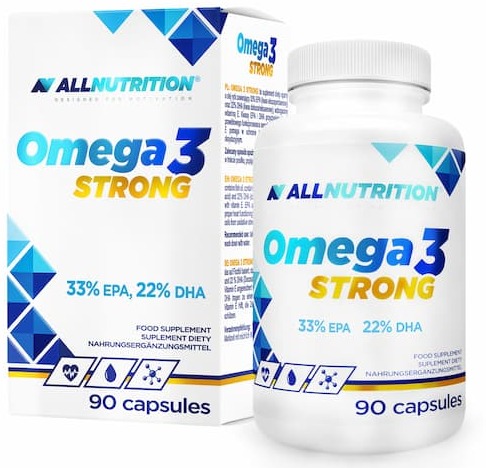
- Content omega-3 acids: 550 mg (DHA 220 mg + EPA 330 mg)
- Additional active ingredients: vitamin E
- Form: capsules .
- Dose: 1 capsule per day .
- Sufficient for: 90 days .
Product description
A dietary supplement with a solid portion of DHA and EPA – valuable for health and well-being omega-3 acidsós. Indicated especially for people on a plant-based diet, physically active people and seniors.
.The sourceóof omega-3 acids in this preparation is fish oil.
.Pros and cons
A dietary supplement with a solid portion of DHA and EPA – valuable for health and well-being omega-3 acidsós. Indicated especially for people on a plant-based diet, physically active people and seniors.
.The sourceóof omega-3 acids in this preparation is fish oil.
.Additional information
A dietary supplement with a solid portion of DHA and EPA – valuable for health and well-being omega-3 acidsós. Indicated especially for people on a plant-based diet, physically active people and seniors.
.The sourceóof omega-3 acids in this preparation is fish oil.
.User review
A dietary supplement with a solid portion of DHA and EPA – valuable for health and well-being omega-3 acidsós. Indicated especially for people on a plant-based diet, physically active people and seniors.
.The sourceóof omega-3 acids in this preparation is fish oil.
.Solgar Omega 3-6-9
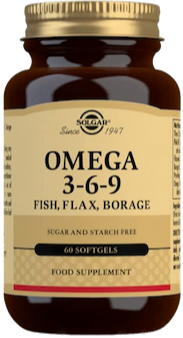
- Content of omega acids:.
- Omega-3 fatty acids.
- Omega-3 fatty acids
- alpha-linolenic acid (ALA) – 585 mg
.- eicosapentaenoic acid (EPA) – 344 mg
- docosahexaenoic acid (DHA) – 221 mg
.
- Omega-3 fatty acids
- Omega-6 fatty acids.
- linoleic acid (LA) – 598 mg .
- gamma-linolenic acid (GLA) – 274 mg .
- Omega-9 fatty acids.
- Oleic acid – 325 mg .
- Omega-3 fatty acids.
- Source of omega acids: fish oil from anchovies, mackerel, sardines, linseed oil, cucumber oil .
- Form: capsules .
- Packaging: 60 capsules .
- Daily allowance:3 capsules per day .
- Sufficient for: 20 days .
Product description
A combination of omega 3-6-9 fatty acidsós derived from fish and plants. The dietary supplement supplements essential omega fatty acids, whichóre needed for the proper functioning of many systemsóorgansóin the body.
Pros and cons
A combination of omega 3-6-9 fatty acidsós derived from fish and plants. The dietary supplement supplements essential omega fatty acids, whichóre needed for the proper functioning of many systemsóorgansóin the body.
Additional information
A combination of omega 3-6-9 fatty acidsós derived from fish and plants. The dietary supplement supplements essential omega fatty acids, whichóre needed for the proper functioning of many systemsóorgansóin the body.
A combination of omega 3-6-9 fatty acidsós derived from fish and plants. The dietary supplement supplements essential omega fatty acids, whichóre needed for the proper functioning of many systemsóorgansóin the body.
Omega + Vitamin D3 800 IU for children
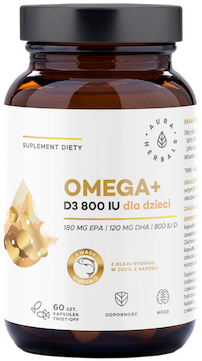
- Content of omega-3 fatty acids: 300 mg (180 mg EPA + 120 mg DHA)
- .
- Additional active ingredients: vitamin D3
- Form: twist-off capsules
- .
- Dose: 1 capsule per day
- .
- Sufficient for: 60 days
- .
Product description
Omega-3 acids for children with added vitamin D3 in good doses. The formula fills the daily requirement of EPA and DHA and vitamin D for children aged 2–18 years.
The Ministry of Health recommends supplementation with vitamin D3. In turn, omega-3 fatty acids are also crucial for the youngest.
The dietary supplement from Aura Herbals supports mós brain function, proper vision and immune system function.
The omega-3 fatty acids are derived from fish oil sourced from anchovies.
Pros and cons
Omega-3 acids for children with added vitamin D3 in good doses. The formula fills the daily requirement of EPA and DHA and vitamin D for children aged 2–18 years.
The Ministry of Health recommends supplementation with vitamin D3. In turn, omega-3 fatty acids are also crucial for the youngest.
The dietary supplement from Aura Herbals supports mós brain function, proper vision and immune system function.
The omega-3 fatty acids are derived from fish oil sourced from anchovies.
Additional information
Omega-3 acids for children with added vitamin D3 in good doses. The formula fills the daily requirement of EPA and DHA and vitamin D for children aged 2–18 years.
The Ministry of Health recommends supplementation with vitamin D3. In turn, omega-3 fatty acids are also crucial for the youngest.
The dietary supplement from Aura Herbals supports mós brain function, proper vision and immune system function.
The omega-3 fatty acids are derived from fish oil sourced from anchovies.
User review
Omega-3 acids for children with added vitamin D3 in good doses. The formula fills the daily requirement of EPA and DHA and vitamin D for children aged 2–18 years.
The Ministry of Health recommends supplementation with vitamin D3. In turn, omega-3 fatty acids are also crucial for the youngest.
The dietary supplement from Aura Herbals supports mós brain function, proper vision and immune system function.
The omega-3 fatty acids are derived from fish oil sourced from anchovies.
{ product:1ZN0pnin20IQ025sIqOBUF }}
Properties of omega-3 fatty acids
.Omega-3 acids have mastered multitasking to perfection and support:
- brain and nervous system, .
- heart and circulatory system, .
- joints, muscles and bones, .
- the workings of the liver, .
- psychology and well-being, .
- sleep and recovery, .
- immune system, .
- control of inflammation, .
- conditioning of hair, skin and nails.
How does this look in practice?
.Promote nervous system function
.Omega-3 fatty acids are needed to build cell membranes in the brain, allowing information to flow smoothly between nerve cells. They can also support neuronal renewal and growth - thus improving your memory and helping with concentrationand.
According to research, polyunsaturated fatty acids may help treat symptoms of neurodegenerative diseases - such as Alzheimer's disease - by inhibiting brain cell death..
 .
.
Marcin Zarzycki physician
Which is to say: they are super important to make your thinking easy.
Influence brain and vision development in infants
.Omega-3 fatty acids, especially DHA, are essential for normal retinal development. Studies have shown that infants fed breast milk or formula milk enriched with omega-3 fatty acids have better vision compared to babies who did not receive n-3and.
Supplementation with omega-3 fatty acids during pregnancy is correlated with higher IQ in the child and better communication and social skills, as well as fewer behavioural problems and a lower risk of developmental delays..
 .
.
Ilona Krzak Master of Pharmacy
Which means: they are super important if you are pregnant or breastfeeding.
See also:
.Provide support for the cardiovascular system
.Omega-3 fatty acids reduce the concentration of triglycerides in the blood, and therefore - help to lower blood pressure. This reduces the risk of cardiovascular disease. A nutritious diet, physical activity and adequate n-3 concentrations prevent hypertension, atherosclerosis, ischaemic heart disease and heart attack.
Important
According toand CSO data, cardiovascular diseases were the most common cause of death in Poland in 2021. They account for more than 35% of all deaths among men and women.
Omega-3 fatty acids may help to lower 'bad' LDL cholesterol, which contributes to the formation of atherosclerotic plaques. These acids help maintain the elasticity of blood vessels, which prevents blockages and heart disease..
 .
.
Witold Tomaszewskidoctor of medical sciences
.Which means: they will allow you to live longer and healthier.
Reduce the symptoms of metabolic syndrome
.Metabolic syndrome consists of several factors - obesity, hypertension, dyslipidaemia and diabetes (or pre-diabetes)and.
Omega-3 fatty acids can reduce all of these symptomsand.
.I mean: they regulate your metabolism.
.Promote joint and bone health
.According to research studiesand supplementation with omega-3 fatty acids reduces pain in people with osteoarthritis. Other studies suggest that n-3 supplementation reduces joint pain and stiffness in people with rheumatoid arthritis (RA) .
Omeega-3 fatty acids increase the amount of calcium in the bones, which can strengthen and improve their structure - which is why supplementation with omega-3 fatty acids is especially important for seniors, who are at risk of osteoporosis and a higher risk of fractures.
Which means: they will strengthen your joints.
Improve athletic performance
.Intervals, cardio or weight training are taxing - especially on the nervous system and muscles. In addition to shakes, protein bars or energy snacks, be sure to include a portion of healthy fats.
Omega-3 fatty acids can improve athletic performance directly - through potentially positive effects on recovery, muscle strength or anaerobic endurance; and indirectly - they have a neuroprotective effect, and on top of that, they reduce the risk of injury or infection, which can exclude you from training..
 .
.
Marek Prawdzik personal trainer and training author
Omega-3s have a positive effect on muscle anabolism. A scientific study showed a significant increase in muscle protein synthesis and a 4% increase in strength. Seven days of omega-3 supplementation at a dose of 3g per day reduced muscle damage and soreness after exercise..
 .
.
Marta Kaczorekclinical nutritionist and personal trainer
Which means: anything sporty - you'll do better.
.Promote liver health
.Scientists suggest that supplementation with omega-3 fatty acids may help reduce fat in the liver and inflammation in people with non-alcoholic fatty liver disease (NAFLD)and.
NAFLD affects up to 25% of the world's population and is thought to be a major cause of several other liver conditions - cirrhosis or scarring .
.See also:
.I mean: your liver will thank you.
.Reduce the risk of depression and anxiety disorders
.Scientific research suggests that adequate intake of omega-3 fatty acids protects against depression and anxiety disordersand. Even if you already struggle with such ailments, omega-3 fatty acids can help treatand.
Metabolites of polyunsaturated fatty acids may increase serotonin, a deficiency of which is key in the development of depression..
 .
.
Marcin Zarzycki physician
Which means: improve your wellbeing.
.Improve sleep quality
.Supplementation with omega-3 fatty acids can improve the length and quality of sleep and protect against the development of sleep disordersand. Low concentrations of n-3 can lead to sleep problems in children and obstructive sleep apnoea in adults .
For dinner, eat foods rich in omega-3 fatty acids, which promote the secretion of melatonin - the sleep hormone - and improve sleep quality. I recommend eating oily fish, nuts or chia seeds..
 .
.
Julia SkrajdaDietitian
.Sleep deprivation is monstrously dangerous. Drowsiness, fatigue and poorer concentration are the tip of the iceberg. If you sleep poorly, you put yourself at risk of serious illnesses - depression, obesity and diabetesand.
I mean: you will sleep better.
.See also: Sleep hygiene: 8 proven ways to get a healthy and good night's sleep
.Reduce the risk of eye disease
.Omega-3 fatty acids help reduce the risk of glaucoma and macular degenerationand.
One of the omega-3 fatty acids - DHA - is a major structural component of the retina. It supports its development and function and thus allows you to see betterand.
Reduce inflammation in the body
.Inflammation in itself is not as bad as they paint it - it is the body's natural response to infection and damage. The stimulus can be bacteria, viruses or foreign bodies. Temporary inflammation 'inactivates' the threats and repairs damaged tissuesand.
The problem arises when inflammation is chronic - this can contribute to the development of cancer, diabetes or neurodegenerative disorders. Omega-3 fatty acids can reduce the production of molecules and substances associated with inflammation.
They can reduce the production of inflammation-related molecules and substances.
Reduce the risk of autoimmune diseases
.In autoimmune diseases, your body attacks itself - the immune system mistakes healthy cells for foreign cells and starts to destroy them. Autoimmune diseases include, for example, diabetes, Hashimoto's disease, multiple sclerosis, rheumatoid arthritis, pustacea. Thanks to their anti-inflammatory effects, omega-3 fatty acids can prevent these diseases and support the treatment of these conditions.
Important
According to one study, increased fatty acid intake in infancy was associated with a lower risk of type 1 diabetes later in lifeand.
Reduce the risk of cancer
.According to some studies, omega-3 fatty acids may prevent or slow the development of cancers of the colon, prostate and breastand.
Reduce menstrual pain
.Pain and stabbing pains in the lower abdomen, sometimes radiating to the back - saliva. Research suggests that women who consume omega-3 fatty acids experience milder menstrual painand.
In one study, researchers showed that a dietary supplement with omega-3s was more effective in treating severe pain during menstruation than ibuprofen .
.Improve the appearance and condition of skin and hair
.DHA acid is a structural component of the skin and is responsible for the health of cell membranes, which form a large part of the skin. Adequate levels of DHA promote skin hydration and protect the skin from premature ageing.
A diet rich in omega-3 fatty acids reduces the risk of acne and prevents excessive keratinisation of hair follicles, which manifests as small, red papules on the skin..
 .
.
Witold Tomaszewskidoctor of medical sciences
.Dentists like it
.An analysis of 2022 studies suggests that supplementation with omega-3 fatty acids significantly improves gingival health in people with periodontitis, compared to patients who were treated with standard treatment without omega-3 supportand.
Omega-3 fatty acids and ADHD
.Some research studies have shown that children with ADHD have lower blood concentrations of omega-3 fatty acids than children without ADHDand. To date, however, the benefit of omega-3 fatty acid supplementation on the treatment of ADHD symptoms has not been demonstrated.
ADHD is a 95% inherited disorder. In contrast, a deficit of omega-3 fatty acids may exacerbate the course of the disorder. Nutritional deficiencies can undermine the effects of therapy, thereby exacerbating neurodevelopmental or psychiatric disorders..
 .
.
Jagoda TurowskaPsychologist and social skills trainer
Omega-3 fatty acids... Do they mellow customs? Interesting research
Research involving 136 Australian prisoners with high levels of aggression found that lower levels of omega-3 fatty acids in the body were associated with greater aggression and attention problemsand.

The types of omega-3 fatty acids: DHA, EPA and ALA
.There are several types of omega-3 fats, which vary in chemical structure, size and popularity among patients, researchers and fit-freaks.
The most important omega-3 fatty acids are:
.- docosahexaenoic acid (DHA), .
- eicosapentaenoic acid (EPA), .
- alpha-linolenic acid (ALA), .
Their synergy, but also their action alone, affects the proper functioning of the body. To get your brain going - read each of these names out loud the first time.
DHA (docosahexaenoic acid)
.It's a favourite of researchers and anyone interested in the subject of health. It forms part of every cell in your body. It is a particularly important structural component of the skin, eyes and brainand.
It is produced by marine algae and the microorganisms that some fish feed on - for example salmon, tuna and sardines .
DHA acid supports:
.- brain, .
- heart, .
- joints and muscles, .
- psychology, .
- resilience, .
- vision, .
- intellect, .
- sugar and insulin metabolism, .
- inflammation control, .
- fertility, .
- skin, .
This is interesting
DHA acid is crucial for the development and proper functioning of the brain and accounts for about 8% of its weight. That's an average of 120g in an adult (as much as a large banana).
The cells of the nervous system are made up of DHA acid, and a deficiency of DHA can even lead to feelings of anxiety and depression in extreme cases.
.. .
Jagoda TurowskaPsychologist and social skills trainer
See also:
.EPA (eicosapentaenoic acid)
.EPA is a specialist in supporting mental health and a skin's best friend.
How does EPA support the body and mind?
.- Improves mental health, can prevent and support the treatment of depression.
- Provides support for mental health.
- Promotes the maintenance of skin hydration.
- Promotes the maintenance of skin hydration.
- Prevents keratosis of the skin. .
- Protects against premature skin ageing. .
- Reduces the risk of acne. .
- Produces eicosanoids - compounds that help reduce inflammation in the body. .
Along with DHA and ALA, it is also involved in the nervous, musculoskeletal, hormonal and cardiovascular systems.
This is interesting
The concentration of EPA in the brain is about 250-300 times lower than the concentration of DHA.
ALA (alpha-linolenic acid)
.Always at the back, not included in the famous DHA + EPA equation, but it has the nicest name and can do its own thing too.
.How does ALA acid affect the bodyand?
- Produces DHA and EPA in small amounts.
- The body's ability to produce DHA and EPA in small amounts.
- The body can produce other bioactive compounds from it, e.g. oxylipins (chemical messengers).
- The body can produce other bioactive compounds from it.
- Helps in the treatment of steatohepatitis (NAFLD).
- Helps in the treatment of steatohepatitis.
- Increases cell sensitivity to insulin. .
- Reduces blood sugar concentrations.
- Helps the blood sugar level.
- Influences cell fluidity and signalling and gene expression. .
- Acts as an anti-inflammatory.
- Can be decomposed.
- May be broken down for energy via the metabolic pathway of β-oxidation.
- May improve cellular sensitivity.
- May improve cellular sensitivity to insulin and reduce the risk of insulin resistance, as well as type 2 diabetes.
The richest source of ALA is flaxseed. One hundred grams contains as much as 22.49g of ALA. Seed has the best ratio of omega-3 to omega-6 compared to other oilseedsand.
Did you know that...
.In addition to DHA, EPA and ALA there are other acids in the omega-3 group? These are, for example, docosapentaenoic (DPA) and stearidonic (SDA) acids.
Requirement for omega-3 fatty acids
.Daily omega-3 fatty acid and fat requirements for infants, children and adolescents
. .|
Ingredient . |
Recommended intake . |
|
| . |
Eicosapentaenoic acid + Docosahexaenoic acid (EHA + DHA) . |
7-24 months: DHA 100 mg/day only; .2-18 years: EPA+DHA 250 mg/day |
|
Alpha-linoleic acid (ALA) . |
0.5% of kcal from fats |
Daily omega-3 fatty acid and fat requirements for adults
. .|
Ingredient . |
Recommended intake . |
|
| . |
Eicosapentaenoic acid + Docosahexaenoic acid (EHA + DHA) . |
250 mg |
|
Alpha-linoleic acid (ALA) |
0.5% of kcal from fats |
How does it look (and taste) in practice? I'll surprise you. A daily dose of 250 mg DHA + EPA is just 8 g of mackerel, 12 g of salmon or 20 g of trout. As you can see, you don't need much, although I encourage you to have a solid portion twice a week rather than a daily bite.
Almega-3 fatty acid deficiency
.In Poland, omega-3 fatty acid deficiency is common. We do not have a tradition of eating fish, and their prices, like nuts or seeds (rich in omega acids) are a deterrent. You will feel and literally see the lack of sufficient omega-3 fatty acids on your own skin.
A deficiency of omega-3 fatty acids manifests itself:
- dry eyes, .
- dryness and irritation of the skin, .
- sensation of skin tightness on the face, .
- dryness of hands and white furrows on knuckles and between fingers,
- acne, .
- keratosis of the skin, .
- pain and stiffness of joints, .
- hair losshair, .
- lower mood and anxietyand. .
Symptoms of omega-3 deficiency are non-specific and may indicate a lack of other vitamins or minerals. However, you should see your doctor if you notice them..
 .
.
Witold Tomaszewskidoctor of medical sciences
.This is interesting
Polans are most commonly deficient in omega-3 fatty acids, vitamin D, calcium, iron, magnesium, iodine, folic acid.
The most common causes of omega-3 fatty acid deficiency are a diet poor in foods rich in these acids. This is especially true for vegans and vegetarians..
 .
.
Julia SkrajdaDietitian
.How to know if I am deficient
.The body signals a nutrient deficiency, so if you observe something worrying, see your doctor. Based on a history of your lifestyle, diet and activity, he or she will help you find the cause.
You can also take a blood test to determine DHA and EPA concentrations. Among other things, the test serves the early prevention of diet-related diseases (e.g. obesity, type II diabetes). The average price of the test is approximately PLN 200.
.Sources of omega-3 fatty acids
. .|
Product . |
Content of omega-3 fatty acids in 100 g* |
|
Flaxseed oil |
5300-6000 mg |
|
Chia seeds (chia seeds) . |
5000-6000 mg |
|
Macre³ |
3000-4000 mg |
|
Walnut |
2500-3000 mg |
|
Sardines |
2200-2500 mg |
|
Cod liver oil (tran) |
2400 mg |
|
Salmon |
2100 mg |
|
Herring |
2000-3000 mg |
|
Salmon trout |
1200-1400 mg . |
|
Tuna |
1000-1500 mg |
|
Shrimp |
300-500 mg |
*The content of omega-3 fatty acids in foods may vary depending on a number of factors, such as the method of farming or heat treatment.
Important
In theory, the most omega-3s are found in flaxseed oil. In practice, this is a bit of a misnomer - omega-3s from flaxseed oil are not particularly well absorbed, and besides, drinking 100 g of pure oil is a dubious pleasure... Therefore, diversity in the diet and consumption of omega acids from several sources is key.
I don't eat fish because it is poisoned. Are they really?"
.Many people actually give up eating fish, for fear of heavy metal contamination. Is that right? Yes, but (my favourite) it depends.
.The fish most at risk of contamination are fish of Asian origin, such as butterfish or panga, and predatory fish, such as swordfish and sharks. These are fish that are not popular in Poland.
The cleanest fish, on the other hand, are wild Pacific salmon, sardines, or pollock.
Purchase fish with MSC certification, which ensures sustainable fish management that saves the environment. Such fish are healthily fed and caught according to strict procedures..
 .
.
Julia SkrajdaDietitian
.Protip: How can you tell if a fish is fresh? It has bright pigment, shiny skin, with little mucus, convex, shiny and non-muddy eyes, firm flesh, bright red gills, and does not smell.
Protip.
Supplementation with omega-3 fatty acids
.Who should take omega-3 fatty acids
.- Vegans and vegetarians .
- Pregnant and breastfeeding women.
- Pregnant and breastfeeding women.
- Children during periods of intensive growth.
- Children during periods of intensive growth.
- Seniors. .
- Patients undergoing cardiac treatment and prevention of heart disease.
- Patients undergoing cardiac treatment and prevention of heart disease.
- Patients suffering from rheumatoid arthritis. .
- Allergic patients. .
- People who are very physically active. .
- Persons who consume low levels of healthy fatsand. .
Omega-3 fatty acids in pregnancy and during breastfeeding
.Valuable omega-3s support the state of pregnancy and motherhood. If you are a mum, take a daily intake of 250 mg DHA + EPA and an additional 100-200 mg DHAand. If you are pregnant, consult your doctor for supplementation, as he or she will know exactly what your condition is, the course of your pregnancy, medications you are taking and other dietary supplements.
Unfortunately, almost 90% of pregnant Polish women consume less than the health-recommended intake. According to scientific studiesand pregnant women consume only 60-87 mg of DHA per day.
My pregnant patients take omega-3 fatty acids. Unfortunately, they often forgo further supplementation after giving birth. It is important to remember that until 6 months of age, the infant obtains DHA acids by relying on breast milk, which is why continued supplementation is so important..
 .
.
Alexandra Cudna Clinical nutritionist
Omega-3 fatty acids and the vege diet
.Vegans and vegetarians may feel overwhelmed by the 'marketing dominance' of salmon, which is associated as the best source of omega-3 fatty acids. And that's not fair - flaxseed oil has 2.5 times more omega-3s than its fishy opponent.
People on a vege diet can use tasty and readily available (and often cheaper than salmon) plant-based sources of omega-3 or choose vegan supplements.
.Vegans and vegetarians can take omega-3 fatty acids in the form of oils from certain species of algae extracted by biotechnology..
 .
.
Alexandra Cudna Clinical nutritionist
Remember, however, that sources of omega-3 fatty acids are not 'equal' in their supply of particular acids. For example, flaxseed is rich in ALA acid, but it is not sufficient for supplementation on its own and will not provide the same benefits as acids from fish oils.
Similarly, omega-3 acids from flaxseed oil are not as well absorbed as fish oil. Therefore, diversity in the diet and consumption of omega acids from several sources is key.
The key to health is diversity in the diet - find room in the diet for multiple sources of omega acids.
What omega-3 acids to choose? Advice from a pharmacist
.Pharmacists' shelves are crammed with omega-3 supplements and various combination formulations. Did you know that the colour of the packaging matters and that fish is not the same as fish? Learn tips from Ilona Krzak, MSc in pharmacy.
.Pay attention to the source of the acids.
.Choose dietary supplements with omega-3 from wild fish. Fish living in the wild eat algae and produce their own omega acids. Most farmed fish contain less of these because they are fed 'artificially'. Look for the 'MSC certified' stamp on the dietary supplement.
Use an appropriate daily dose, tailored to your needs.
.The average adult should consume 250 mg of eicosapentaenoic acid (EPA) and docosahexaenoic acid (DHA) daily. Taking a 'stock' is pointless as your body gets rid of excess omega acids.
Choose the best form of dietary supplement.
.The omega-3 oils in emulsified form absorb better than in pure form (e.g. from ordinary oil). "Emulsified" oil is oil that has been mixed with water and an emulsifier, so that it forms a stable emulsion. Such a liquid can be consumed in capsules or from a bottle.
Omega-3 capsules have a longer shelf life and their airtight seal ensures that the oil is not exposed to air, prolonging its quality.
 .
.
Ilona Krzak Master of Pharmacy
."This ensures that such dietary supplements are free of unnecessary preservatives or antioxidants," adds the MSc pharmacist.
Look at TOTOX
.TOTOX (Total Oxidation) is a measure used to determine the stability of fish fats, assessing their quality and determining their degree of oxidation. The higher the TOTOX index, the higher the risk that fish fats are stale or oxidised. A low TOTOX index value indicates high quality fish fats that are fresh and not oxidised.
According to the European Food Safety Authority, the TOTOX index should be ≤ 26. This then means that the fish fats are fresh and low in oxidation.
Total oxidation index.
Pay attention to packaging
.Omega-3 fatty acids sold in liquid form should be sealed in a dark bottle that protects the contents from harmful sunlight. This ensures that the liquid retains its valuable properties for longer.
Omega-3 + D3, omega-3 + ADEK, omega 3-6-9... Is it too much?
.It is understandable that you want to take comprehensive care of yourself. Especially when the supplement packaging shows a smiling salmon or a handsome Norwegian - a specimen of health. In supplementation, however, focus on quality, not quantity.
Supplementation is tailored to individual needs. Before taking a combined preparation, e.g. omega-3 + D3, it is worthwhile to determine the concentration of vitamin D3. Vitamin A, vitamin E and vitamin K are easily obtained from the diet and their required supplementation is rare..
 .
.
Witold Tomaszewskidoctor of medical sciences
."Dietary supplements of omega 3-6-9 are unnecessary because the body produces omega-9 acids on its own, and in the diet we provide too much omega-6 and not enough omega-3. Adding more acids to this mix can lead to an even greater imbalance between the two," adds the doctor.
The body's own production of omega-9 acids is unnecessary.
Is an excess of omega-3 fatty acids possible?
.When I was a kid and drank a spoonful of cod liver oil, I felt like my life bar was growing (like in a game). Nowadays, I occasionally see some adults drinking trance from a thread or taking a sip of capsules "to stock up". Unfortunately, this may be game over.
Overdose of omega-3 fatty acids occurs from over-supplementation. Overdose is rare but possible. The symptoms are unpleasant and dangerous to health..
 .
.
Witold Tomaszewskidoctor of medical sciences
.Wondering if you need to cut down on your favourite fish or counting how many walnuts you can eat a day? Don't worry. A nutritionist explains:
It is impossible to overdose on omega-3s from food. The body naturally removes them in excess. To lead to an excess of omega-3 fatty acids, we would have to eat, for example, about 2.5 kg of salmon per day.
 .
.
Julia SkrajdaDietitian
.Uff. Take it easy on the nuts, and drizzle the salmon planned for dinner with lemon. It turns up its flavour.
Symptoms of excess omega-3 fatty acids
.Too much omega-3 in the body gives the following symptoms:
- decreased blood clotting, .
- nose bleeding, .
- diarrhoea, flatulence, belching, nausea, .
- increase in blood sugar,
- increase in blood pressure,
- diarrhoea.
- reflux, .
- increased insomnia or anxietyand. .
Beware of "combination" supplements. Check the leaflet for the exact formulation and make sure you're not duplicating, for example, vitamin D3, which you may be taking in another preparation, or vitamin A, of which there may be as much as 270% of your daily requirement in one tablespoon of cod liver oil.
 .
.
Witold Tomaszewskidoctor of medical sciences
.Omega-3-6-9 acids
.The ideal ratio of omega-3 to omega-6 intake is between 1:1 and 1:4. This balance ensures their undisturbed function and harmony in the body.
Doctors and nutritionists are sounding the alarm because the modern 'Western diet' provides us with too much omega-6 and not enough omega-3 (in ratios as low as 1:17)and. If you supplement with 3-6-9 supplements, you can further disrupt the balance of these acids.
What to do about it? Dump the 3-6-9 supplements, wipe the sweat off your brow and don't stress about calculating the grams of fat in each meal. Use common sense to follow a few nutritional tips:
- Regularly eat fish, e.g. salmon, tuna, mackerel, herring.
- Eat fish regularly.
- Add your favourite nuts and seeds to your menu, e.g. walnuts or chia.
- Eat a variety of nuts and seeds.
- Avoid highly processed foods, e.g. convenience foods, sweets, snacks. .
Important
Remember to be physically active too - you can cook a dinner with the perfect 'macro' (yet take a beautiful photo for Instagram), but without movement, you won't achieve full health.
What not to combine omega-3 fatty acids with? Interactions
Dietary supplements with omega acids may interact with medications that affect blood clotting, such as aspirin, warfarin or heparinand. Consult your doctor or pharmacist before starting supplements to avoid harming yourself.
It is not advisable to drink alcohol during supplementation with omega-3 fatty acids. It radically alters lipid metabolism. It negatively affects the important metabolism of omega acids in the body..
 .
.
Ilona Krzak Master of Pharmacy
See also:
.- How to choose the best omega-3? .
- Omega-3 medicine, not a supplement .
- Best omega-3 in tablets
- Vitamin D3 deficiency
Summary
.- Omega-3 supplements and cod liver oil are among the few supplements that make sense and have a positive effect on almost everything. .
- You need to supply your body with omega-3 fatty acids from your diet. .
- The most important acids for the body are docosahexaenoic (DHA), eicosapentaenoic (EPA) and alpha-linolenic (ALA) acids.
- The most important for the body are docosahexaenoic (DHA), eicosapentaenoic (EPA) and alpha-linolenic (ALA) acids.
- An adult should consume 250 mg of DHA + EPA per day - you probably aren't getting that much. .
- The best sources of omega-3 are primarily wild fish like mackerel, sardines, salmon, but also flaxseed oil, chia seeds, walnuts.
FAQ
.Is there an omega-3 product registered as a medicine not a supplement?
.Omega-3 in drug form can be found in the preparation Omacor. This is a prescription medicine that contains 1000 mg of DHA + EPA acids in capsule form. On the other hand, an over-the-counter medicine containing fish oil is Hasco Tran in capsule form.
Which omega-3 is best?
.The best omega-3 acids are derived from wild-caught fish and should be MSC certified. For best bioavailability to the body, choose the emulsified form, which is encapsulated in a capsule. The packaging must be in a dark bottle to protect the acids from harmful sunlight.
How long can omega-3 acids be used?
.Supplementation with omega-3 fatty acids should be tailored to your individual needs, diet and lifestyle. If your diet lacks healthy fats, you can use omega-3 fatty acids from dietary supplements throughout the year.
What fruit contains omega-3 fatty acids?
.The most omega-3 fatty acids are contained in avocados - approximately 111 mg/100 g of fruit. Avocados are also a valuable source of B vitamins (B1 - thiamin, B2 - riboflavin, B-9 - folic acid), vitamin A, vitamin C, vitamin E and minerals such as potassium, iron, calcium, copper, manganese.
What time of day to take omega-3 fatty acids?
.The time of day you take omega-3 fatty acids does not matter, but the presence of fats when consumed is important to ensure the best absorption into the body. Supplement omega-3 fatty acids with healthy fats such as avocados, salmon, nuts and canola oil.
Some people should not consume omega-3 fatty acids on an empty stomach, as this can cause unpleasant belching and a fishy aftertaste in the mouth. Useful tip: swallow the capsule before you start eating, rather than after, to eliminate the rebound.
How much omega-3 fatty acids are in an egg?
.The content of omega-3 fatty acids in an egg depends on the breed of hen, her diet and the farming conditions. An egg from an outdoor hen may contain 300-700 mg of omega-3 fatty acids, while an egg from an industrial farm hen may contain 30-80 mg. When buying eggs, look out for the rearing method label. The best are 0 (organic) and 1 (free-range).
Do you get fat from omega-3 fatty acids?
.You get fat from a caloric surplus, not from specific products. If we consume excess dietary fats (including omega-3 fatty acids), you may gain weight. However, adding an omega-3 capsule to your daily meal should not affect your weight. Remember, fats are important in the diet and we need to provide the body with approximately 0.7g per kg of body weight.
How many calories does an omega-3 have?
.Omega-3 fatty acids are fats, so they contain about 9 kcal per 100 g. On average, one capsule of omega-3 contains 10 kcal, while a tablespoon of cod liver oil contains about 70 kcal. Remember that fats are needed for the body to function properly and we should consume about 0.7 g per kg of body weight.
Are trane and omega the same thing?
.No, because the name tran covers only cod liver oil and cod fish oil, and omega 3 dietary supplements contain other fish oils e.g. anchovy, sardine, shark liver, krill and may not use the name tranium.
Sources
.See all
.Abdelnour, E., Jansen, M. O., & Gold, J. A. (2022). ADHD Diagnostic Trends: Increased Recognition or Overdiagnosis? Missouri Medicine, 119(5), 467-473.
.Anderson, G. J., Connor, W. E., & Corliss, J. D. (1990). Docosahexaenoic acid is the preferred dietary n-3 fatty acid for the development of the brain and retina. Pediatric Research, 27(1), 89-97. https://doi.org/10.1203/00006450-199001000-00023
Association between dietary omega-3 fatty acid intake and depression in postmenopausal women-PMC. (n.d.). Retrieved March 28, 2023, from https://www.ncbi.nlm.nih.gov/pmc/articles/PMC8313386/
Avallone, R., Vitale, G., & Bertolotti, M. (2019). Omega-3 Fatty Acids and Neurodegenerative Diseases: New Evidence in Clinical Trials. International Journal of Molecular Sciences, 20(17), 4256. https://doi.org/10.3390/ijms20174256
Behboudi-Gandevani, S., Hariri, F.-Z., & Moghaddam-Banaem, L. (2018). The effect of omega 3 fatty acid supplementation on premenstrual syndrome and health-related quality of life: A randomized clinical trial. Journal of Psychosomatic Obstetrics and Gynaecology, 39(4), 266-272. https://doi.org/10.1080/0167482X.2017.1348496
Calder, P. C. (2010). Omega-3 Fatty Acids and Inflammatory Processes. Nutrients, 2(3), 355-374. https://doi.org/10.3390/nu2030355
Castro Dos Santos, N. C., Furukawa, M. V., Oliveira-Cardoso, I., Cortelli, J. R., Feres, M., Van Dyke, T., & Rovai, E. S. (2022). Does the use of omega-3 fatty acids as an adjunct to non-surgical periodontal therapy provide additional benefits in the treatment of periodontitis? A systematic review and meta-analysis. Journal of Periodontal Research, 57(3), 435-447. https://doi.org/10.1111/jre.12984
Chang, J. P.-C., Su, K.-P., Mondelli, V., & Pariante, C. M. (2018). Omega-3 Polyunsaturated Fatty Acids in Youths with Attention Deficit Hyperactivity Disorder: A Systematic Review and Meta-Analysis of Clinical Trials and Biological Studies. Neuropsychopharmacology, 43(3), 534-545. https://doi.org/10.1038/npp.2017.160
Ciubotaru, I., Lee, Y.-S., & Wander, R. C. (2003). Dietary fish oil decreases C-reactive protein, interleukin-6, and triacylglycerol to HDL-cholesterol ratio in postmenopausal women on HRT. The Journal of Nutritional Biochemistry, 14(9), 513-521. https://doi.org/10.1016/s0955-2863(03)00101-3
Coletta, J. M., Bell, S. J., & Roman, A. S. (2010). Omega-3 Fatty Acids and Pregnancy. Reviews in Obstetrics and Gynecology, 3(4), 163-171.
Craddock, J. C., Probst, Y. C., Neale, E. P., & Peoples, G. E. (2022). A Cross-Sectional Comparison of the Whole Blood Fatty Acid Profile and Omega-3 Index of Male Vegan and Omnivorous Endurance Athletes. Journal of the American Nutrition Association, 41(3), 333-341. https://doi.org/10.1080/07315724.2021.1886196
Deutch, B. (1995). Menstrual pain in Danish women correlated with low n-3 polyunsaturated fatty acid intake. European Journal of Clinical Nutrition, 49(7), 508-516.
.Dyall, S. C. (2015). Long-chain omega-3 fatty acids and the brain: A review of the independent and shared effects of EPA, DPA and DHA. Frontiers in Aging Neuroscience, 7, 52. https://doi.org/10.3389/fnagi.2015.00052
Ebrahimi, M., Ghayour-Mobarhan, M., Rezaiean, S., Hoseini, M., Parizade, S. M. R., Farhoudi, F., Hosseininezhad, S. J., Tavallaei, S., Vejdani, A., Azimi-Nezhad, M., Shakeri, M. T., Rad, M. A., Mobarra, N., Kazemi-Bajestani, S. M. R., & Ferns, G. A. A. (2009). Omega-3 fatty acid supplements improve the cardiovascular risk profile of subjects with metabolic syndrome, including markers of inflammation and auto-immunity. Acta Cardiologica, 64(3), 321-327. https://doi.org/10.2143/AC.64.3.2038016
EFSA Panel on Dietetic Products, Nutrition and Allergies (NDA). (2012). Scientific Opinion on the Tolerable Upper Intake Level of eicosapentaenoic acid (EPA), docosahexaenoic acid (DHA) and docosapentaenoic acid (DPA). EFSA Journal, 10(7), 2815. https://doi.org/10.2903/j.efsa.2012.2815
Elbahnasawy, A. S., Valeeva, E. R., El-Sayed, E. M., & Stepanova, N. V. (2019). Protective effect of dietary oils containing omega-3 fatty acids against glucocorticoid-induced osteoporosis. Journal of Nutrition and Health, 52(4), 323-331. https://doi.org/10.4163/jnh.2019.52.4.323
Eslick, G. D., Howe, P. R. C., Smith, C., Priest, R., & Bensoussan, A. (2009). Benefits of fish oil supplementation in hyperlipidemia: A systematic review and meta-analysis. International Journal of Cardiology, 136(1), 4-16. https://doi.org/10.1016/j.ijcard.2008.03.092
Fatty Acids-An overview | ScienceDirect Topics. (n.d.). Retrieved March 9, 2023, from https://www.sciencedirect.com/topics/earth-and-planetary-sciences/fatty-acids
Fortin, P. R., Lew, R. A., Liang, M. H., Wright, E. A., Beckett, L. A., Chalmers, T. C., & Sperling, R. I. (1995). Validation of a meta-analysis: The effects of fish oil in rheumatoid arthritis. Journal of Clinical Epidemiology, 48(11), 1379-1390. https://doi.org/10.1016/0895-4356(95)00028-3
Friday, K. E., Childs, M. T., Tsunehara, C. H., Fujimoto, W. Y., Bierman, E. L., & Ensinck, J. W. (1989). Elevated plasma glucose and lowered triglyceride levels from omega-3 fatty acid supplementation in type II diabetes. Diabetes Care, 12(4), 276-281. https://doi.org/10.2337/diacare.12.4.276
Furman, D., Campisi, J., Verdin, E., Carrera-Bastos, P., Targ, S., Franceschi, C., Ferrucci, L., Gilroy, D. W., Fasano, A., Miller, G. W., Miller, A. H., Mantovani, A., Weyand, C. M., Barzilai, N., Goronzy, J. J., Rando, T. A., Effros, R. B., Lucia, A., Kleinstreuer, N., & Slavich, G. M. (2019). Chronic inflammation in the etiology of disease across the life span. Nature medicine, 25(12), 1822-1832. https://doi.org/10.1038/s41591-019-0675-0
Greenberg, J. A., Bell, S. J., & Ausdal, W. V. (2008). Omega-3 Fatty Acid Supplementation During Pregnancy. Reviews in Obstetrics and Gynecology, 1(4), 162-169.
Grosso, G., Galvano, F., Marventano, S., Malaguarnera, M., Bucolo, C., Drago, F., & Caraci, F. (2014). Omega-3 Fatty Acids and Depression: Scientific Evidence and Biological Mechanisms. Oxidative Medicine and Cellular Longevity, 2014, 313570. https://doi.org/10.1155/2014/313570
Guesnet, P., & Alessandri, J.-M. (2011). Docosahexaenoic acid (DHA) and the developing central nervous system (CNS)-Implications for dietary recommendations. Biochimie, 93(1), 7-12. https://doi.org/10.1016/j.biochi.2010.05.005
Guo, Y., Ma, B., Li, X., Hui, H., Zhou, Y., Li, N., & Xie, X. (2022). Omega-3 Polyunsaturated Fatty Acids can Reduce IL-6 and TNF Levels in Patients with Cancer. The British Journal of Nutrition, 1-34. https://doi.org/10.1017/S0007114522000575
GUS. (n.d.-a). Statistics of deaths and mortality from cardiovascular diseases. stat.gov.pl. Downloaded 28 March 2023, from https://stat.gov.pl/obszary-tematyczne/ludnosc/ludnosc/statystyka-zgonow-i-umieralnosci-z-powodu-chorob-ukladu-krazenia,22,1.html
.GUS. (n.d.-b). Deaths in 2021. Deaths by cause-Preliminary data. stat.gov.pl. Retrieved 28 March 2023, from https://stat.gov.pl/obszary-tematyczne/ludnosc/statystyka-przyczyn-zgonow/umieralnosc-w-2021-roku-zgony-wedlug-przyczyn-dane-wstepne,10,3.html
Helland, I. B., Smith, L., Saarem, K., Saugstad, O. D., & Drevon, C. A. (2003). Maternal supplementation with very-long-chain n-3 fatty acids during pregnancy and lactation augments children's IQ at 4 years of age. Pediatrics, 111(1), e39-44. https://doi.org/10.1542/peds.111.1.e39
Horrocks, L. A., & Yeo, Y. K. (1999). Health benefits of docosahexaenoic acid (DHA). Pharmacological Research, 40(3), 211-225. https://doi.org/10.1006/phrs.1999.0495
Institute of Medicine (US) Committee on Nutrition, T., Erdman, J., Oria, M., & Pillsbury, L. (2011). Eicosapentaenoic Acid (EPA) and Docosahexaenoic Acid (DHA). In Nutrition and Traumatic Brain Injury: Improving Acute and Subacute Health Outcomes in Military Personnel. National Academies Press (US). https://www.ncbi.nlm.nih.gov/books/NBK209320/
Jiang, H., Shi, X., Fan, Y., Wang, D., Li, B., Zhou, J., Pei, C., & Ma, L. (2021). Dietary omega-3 polyunsaturated fatty acids and fish intake and risk of age-related macular degeneration. Clinical Nutrition (Edinburgh, Scotland), 40(12), 5662-5673. https://doi.org/10.1016/j.clnu.2021.10.005
Kavyani, Z., Musazadeh, V., Fathi, S., Hossein Faghfouri, A., Dehghan, P., & Sarmadi, B. (2022). Efficacy of the omega-3 fatty acids supplementation on inflammatory biomarkers: An umbrella meta-analysis. International Immunopharmacology, 111, 109104. https://doi.org/10.1016/j.intimp.2022.109104
Kawamura, A., Ooyama, K., Kojima, K., Kachi, H., Abe, T., Amano, K., & Aoyama, T. (2011). Dietary supplementation of gamma-linolenic acid improves skin parameters in subjects with dry skin and mild atopic dermatitis. Journal of Oleo Science, 60(12), 597-607. https://doi.org/10.5650/jos.60.597
Kessler, R. C., Chiu, W. T., Demler, O., Merikangas, K. R., & Walters, E. E. (2005). Prevalence, severity, and comorbidity of 12-month DSM-IV disorders in the National Comorbidity Survey Replication. Archives of General Psychiatry, 62(6), 617-627. https://doi.org/10.1001/archpsyc.62.6.617
Khalili, L., Valdes-Ramos, R., & Harbige, L. S. (2021). Effect of n-3 (Omega-3) Polyunsaturated Fatty Acid Supplementation on Metabolic and Inflammatory Biomarkers and Body Weight in Patients with Type 2 Diabetes Mellitus: A Systematic Review and Meta-Analysis of RCTs. Metabolites, 11(11), 742. https://doi.org/10.3390/metabo11110742
Kiecolt-Glaser, J. K., Belury, M. A., Andridge, R., Malarkey, W. B., & Glaser, R. (2011). Omega-3 supplementation lowers inflammation and anxiety in medical students: A randomized controlled trial. Brain, Behavior, and Immunity, 25(8), 1725-1734. https://doi.org/10.1016/j.bbi.2011.07.229
Kruger, M. C., Coetzer, H., de Winter, R., Gericke, G., & van Papendorp, D. H. (1998). Calcium, gamma-linolenic acid and eicosapentaenoic acid supplementation in senile osteoporosis. Aging (Milan, Italy), 10(5), 385-394. https://doi.org/10.1007/BF03339885
Kucukgoncu, S., Zhou, E., Lucas, K. B., & Tek, C. (2017). Alpha-Lipoic Acid (ALA) as a supplementation for weight loss: Results from a Meta-Analysis of Randomized Controlled Trials. Obesity reviews : an official journal of the International Association for the Study of Obesity, 18(5), 594-601. https://doi.org/10.1111/obr.12528
Lavialle, M., Champeil-Potokar, G., Alessandri, J. M., Balasse, L., Guesnet, P., Papillon, C., Pévet, P., Vancassel, S., Vivien-Roels, B., & Denis, I. (2008). An (n-3) polyunsaturated fatty acid-deficient diet disturbs daily locomotor activity, melatonin rhythm, and striatal dopamine in Syrian hamsters. The Journal of Nutrition, 138(9), 1719-1724. https://doi.org/10.1093/jn/138.9.1719
Leaf, A. (2008). Historical overview of n-3 fatty acids and coronary heart disease. The American Journal of Clinical Nutrition, 87(6), 1978S-80S. https://doi.org/10.1093/ajcn/87.6.1978S
Li, J., Xun, P., Zamora, D., Sood, A., Liu, K., Daviglus, M., Iribarren, C., Jacobs, D., Shikany, J. M., & He, K. (2013). Intakes of long-chain omega-3 (n-3) PUFAs and fish in relation to incidence of asthma among American young adults: the CARDIA study123. The American Journal of Clinical Nutrition, 97(1), 181-186. https://doi.org/10.3945/ajcn.112.041145
Liao, Y., Xie, B., Zhang, H., He, Q., Guo, L., Subramanieapillai, M., Fan, B., Lu, C., & McIntyre, R. S. (2019). Efficacy of omega-3 PUFAs in depression: A meta-analysis. Translational Psychiatry, 9, 190. https://doi.org/10.1038/s41398-019-0515-5
Liu, G., Liu, J., Pian, L., Gui, S., & Lu, B. (2019). α-lipoic acid protects against carbon tetrachloride-induced liver cirrhosis through the suppression of the TGF-β/Smad3 pathway and autophagy. Molecular Medicine Reports, 19(2), 841-850. https://doi.org/10.3892/mmr.2018.9719
Mano, Y., Kato, A., Fukuda, N., Yamada, K., & Yanagimoto, K. (2022). Influence of Ingestion of Eicosapentaenoic Acid-Rich Fish Oil on Oxidative Stress at the Menstrual Phase: A Randomized, Double-Blind, Placebo-Controlled, Parallel-Group Trial. Women's Health Reports, 3(1), 643-651. https://doi.org/10.1089/whr.2022.0003
Marine Oils. (2006). In Drugs and Lactation Database (LactMed®). National Institute of Child Health and Human Development. http://www.ncbi.nlm.nih.gov/books/NBK501898/
Martins, J. G. (2009). EPA but not DHA appears to be responsible for the efficacy of omega-3 long chain polyunsaturated fatty acid supplementation in depression: Evidence from a meta-analysis of randomized controlled trials. Journal of the American College of Nutrition, 28(5), 525-542. https://doi.org/10.1080/07315724.2009.10719785
Merle, B. M. J., Benlian, P., Puche, N., Bassols, A., Delcourt, C., Souied, E. H., & Nutritional AMD Treatment 2 Study Group. (2014). Circulating omega-3 Fatty acids and neovascular age-related macular degeneration. Investigative Ophthalmology & Visual Science, 55(3), 2010-2019. https://doi.org/10.1167/iovs.14-13916
Mohajeri, M. H., Troesch, B., & Weber, P. (2015). Inadequate supply of vitamins and DHA in the elderly: Implications for brain aging and Alzheimer-type dementia. Nutrition (Burbank, Los Angeles County, Calif.), 31(2), 261-275. https://doi.org/10.1016/j.nut.2014.06.016
Montgomery, P., Burton, J. R., Sewell, R. P., Spreckelsen, T. F., & Richardson, A. J. (2014). Fatty acids and sleep in UK children: subjective and pilot objective sleep results from the DOLAB study--a randomized controlled trial. Journal of Sleep Research, 23(4), 364-388. https://doi.org/10.1111/jsr.12135
Nelson, J. R., Wani, O., May, H. T., & Budoff, M. (2017). Potential benefits of eicosapentaenoic acid on atherosclerotic plaques. Vascular Pharmacology, 91, 1-9. https://doi.org/10.1016/j.vph.2017.02.004
Oelrich, B., Dewell, A., & Gardner, C. D. (2013). Effect of fish oil supplementation on serum triglycerides, LDL cholesterol and LDL subfractions in hypertriglyceridemic adults. Nutrition, Metabolism, and Cardiovascular Diseases: NMCD, 23(4), 350-357. https://doi.org/10.1016/j.numecd.2011.06.003
Office of Dietary Supplements-Omega-3 Fatty Acids. (n.d.). Retrieved March 16, 2023, from https://ods.od.nih.gov/factsheets/Omega3FattyAcids-Consumer/
Oliveira, J. M., & Rondó, P. H. C. (2011). Omega-3 fatty acids and hypertriglyceridemia in HIV-infected subjects on antiretroviral therapy: Systematic review and meta-analysis. HIV Clinical Trials, 12(5), 268-274. https://doi.org/10.1310/hct1205-268
Omega-3 fatty acids' supplementation in Alzheimer's disease: A systematic review-PubMed. (n.d.). Retrieved March 28, 2023, from https://pubmed.ncbi.nlm.nih.gov/28466678/
Omega-3-6-9 Fatty Acids: A Complete Overview. (2020, October 5). Healthline. https://www.healthline.com/nutrition/omega-3-6-9-overview
Pahwa, R., Goyal, A., & Jialal, I. (2022). Chronic Inflammation. In StatPearls. StatPearls Publishing. http://www.ncbi.nlm.nih.gov/books/NBK493173/
.Parke, M. A., Perez-Sanchez, A., Zamil, D. H., & Katta, R. (2021). Diet and Skin Barrier: The Role of Dietary Interventions on Skin Barrier Function. Dermatology Practical & Conceptual, 11(1), e2021132. https://doi.org/10.5826/dpc.1101a132
Perera, H., Jeewandara, K. C., Seneviratne, S., & Guruge, C. (2012). Combined ω3 and ω6 supplementation in children with attention-deficit hyperactivity disorder (ADHD) refractory to ... treatment: A double-blind, placebo-controlled study. Journal of Child Neurology, 27(6), 747-753. https://doi.org/10.1177/0883073811435243
Peuhkuri, K., Sihvola, N., & Korpela, R. (2012). Dietary factors and fluctuating levels of melatonin. Food & Nutrition Research, 56, 10.3402/fnr.v56i0.17252. https://doi.org/10.3402/fnr.v56i0.17252
Ramel, A., Martinez, J. A., Kiely, M., Bandarra, N. M., & Thorsdottir, I. (2010). Moderate consumption of fatty fish reduces diastolic blood pressure in overweight and obese European young adults during energy restriction. Nutrition (Burbank, Los Angeles County, Calif.), 26(2), 168-174. https://doi.org/10.1016/j.nut.2009.04.002
Ross, B. M. (2007). Omega-3 fatty acid deficiency in major depressive disorder is caused by the interaction between diet and a genetically determined abnormality in phospholipid metabolism. Medical Hypotheses, 68(3), 515-524. https://doi.org/10.1016/j.mehy.2006.07.054
SanGiovanni, J. P., & Chew, E. Y. (2005). The role of omega-3 long-chain polyunsaturated fatty acids in health and disease of the retina. Progress in Retinal and Eye Research, 24(1), 87-138. https://doi.org/10.1016/j.preteyeres.2004.06.002
Sawada, Y., Saito-Sasaki, N., & Nakamura, M. (2021). Omega 3 Fatty Acid and Skin Diseases. Frontiers in Immunology, 11, 623052. https://doi.org/10.3389/fimmu.2020.623052
Singh, R. B., Dubnov, G., Niaz, M. A., Ghosh, S., Singh, R., Rastogi, S. S., Manor, O., Pella, D., & Berry, E. M. (2002). Effect of an Indo-Mediterranean diet on progression of coronary artery disease in high-risk patients (Indo-Mediterranean Diet Heart Study): A randomised single-blind trial. Lancet (London, England), 360(9344), 1455-1461. https://doi.org/10.1016/S0140-6736(02)11472-3
Spite, M. (2013). Deciphering the role of omega-3 polyunsaturated fatty acid-derived lipid mediators in health and disease. The Proceedings of the Nutrition Society, 72(4), 441-450. https://doi.org/10.1017/S0029665113003030
Stevens, L. J., Zentall, S. S., Deck, J. L., Abate, M. L., Watkins, B. A., Lipp, S. R., & Burgess, J. R. (1995). Essential fatty acid metabolism in boys with attention-deficit hyperactivity disorder. The American Journal of Clinical Nutrition, 62(4), 761-768. https://doi.org/10.1093/ajcn/62.4.761
Strickland, A. D. (2014). Prevention of cerebral palsy, autism spectrum disorder, and attention deficit-hyperactivity disorder. Medical Hypotheses, 82(5), 522-528. https://doi.org/10.1016/j.mehy.2014.02.003
Surette, M. E. (2008). The science behind dietary omega-3 fatty acids. CMAJ : Canadian Medical Association Journal, 178(2), 177-180. https://doi.org/10.1503/cmaj.071356
Tai, E. K. K., Wang, X. B., & Chen, Z.-Y. (2013). An update on adding docosahexaenoic acid (DHA) and arachidonic acid (AA) to baby formula. Food & Function, 4(12), 1767-1775. https://doi.org/10.1039/c3fo60298b
Tanaka, K., Farooqui, A. A., Siddiqi, N. J., Alhomida, A. S., & Ong, W.-Y. (2012). Effects of Docosahexaenoic Acid on Neurotransmission. Biomolecules & Therapeutics, 20(2), 152-157. https://doi.org/10.4062/biomolther.2012.20.2.152
The top 10 causes of death. (n.d.). Retrieved March 15, 2023, from https://www.who.int/news-room/fact-sheets/detail/the-top-10-causes-of-death
Theodoratou, E., McNeill, G., Cetnarskyj, R., Farrington, S. M., Tenesa, A., Barnetson, R., Porteous, M., Dunlop, M., & Campbell, H. (2007). Dietary fatty acids and colorectal cancer: A case-control study. American Journal of Epidemiology, 166(2), 181-195. https://doi.org/10.1093/aje/kwm063
Thomsen, B. J., Chow, E. Y., & Sapijaszko, M. J. (2020). The Potential Uses of Omega-3 Fatty Acids in Dermatology: A Review. Journal of Cutaneous Medicine and Surgery, 24(5), 481-494. https://doi.org/10.1177/1203475420929925
Wani, A. L., Bhat, S. A., & Ara, A. (2015). Omega-3 fatty acids and the treatment of depression: A review of scientific evidence. Integrative Medicine Research, 4(3), 132-141. https://doi.org/10.1016/j.imr.2015.07.003
Zafari, M., Behmanesh, F., & Agha Mohammadi, A. (2011). Comparison of the effect of fish oil and ibuprofen on treatment of severe pain in primary dysmenorrhea. Caspian Journal of Internal Medicine, 2(3), 279-282.
Zaouali-Ajina, M., Gharib, A., Durand, G., Gazzah, N., Claustrat, B., Gharib, C., & Sarda, N. (1999). Dietary docosahexaenoic acid-enriched phospholipids normalize urinary melatonin excretion in adult (n-3) polyunsaturated fatty acid-deficient rats. The Journal of Nutrition, 129(11), 2074-2080. https://doi.org/10.1093/jn/129.11.2074
Wawryszuk, N. (2023). Omega acids. Everything you need to know (B. Turczynski, Ed.; 1st ed.). Natu.Care. https://books.google.com/books?vid=9788396887818
.Editorials
Meet the team



Omega-3 fatty acids are a useful dietary supplement for active people - improves performance and fitness.
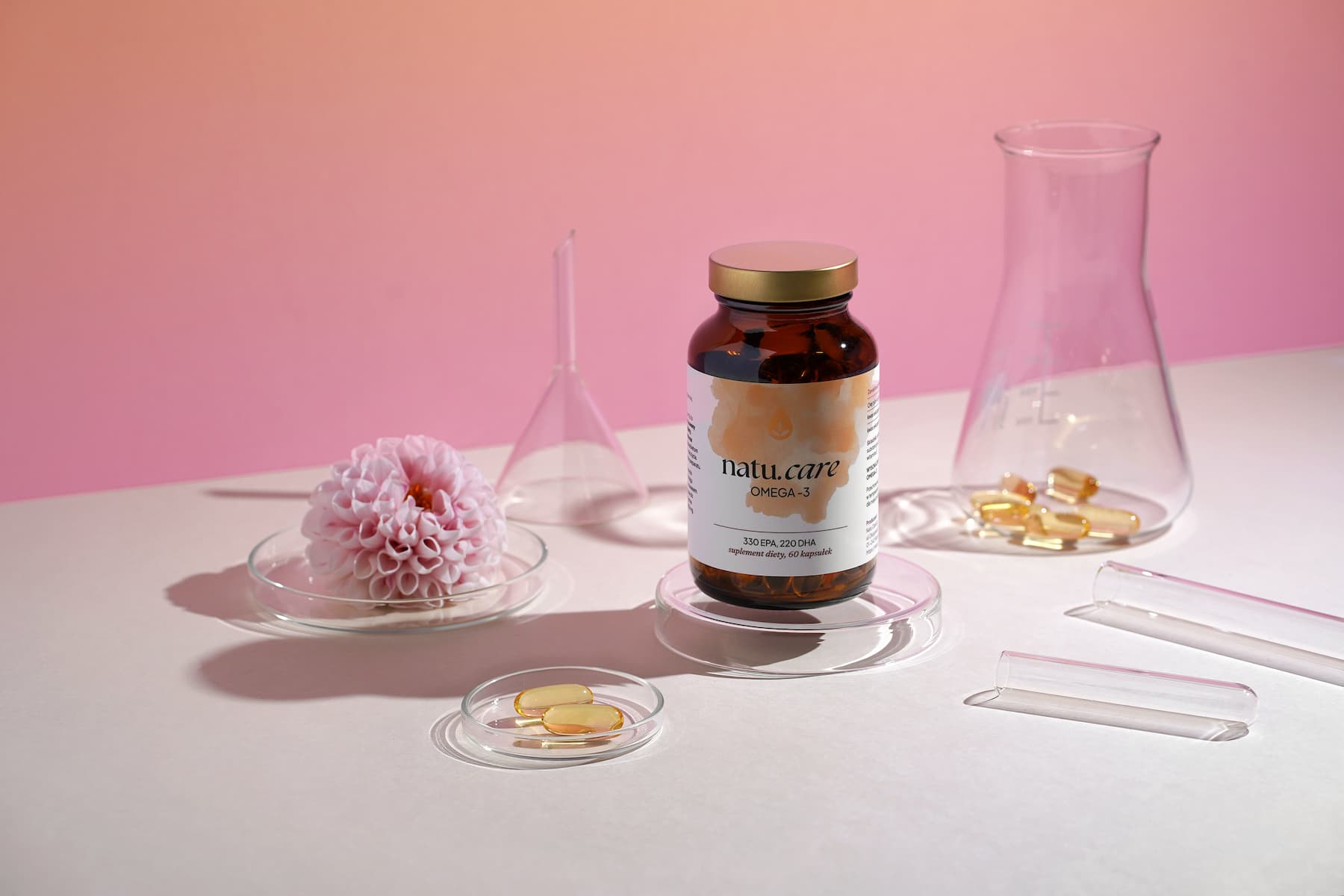
Omega-3 in a good dose and an optimum ratio of DHA and EPA acids will replenish valuable fats in the diet.
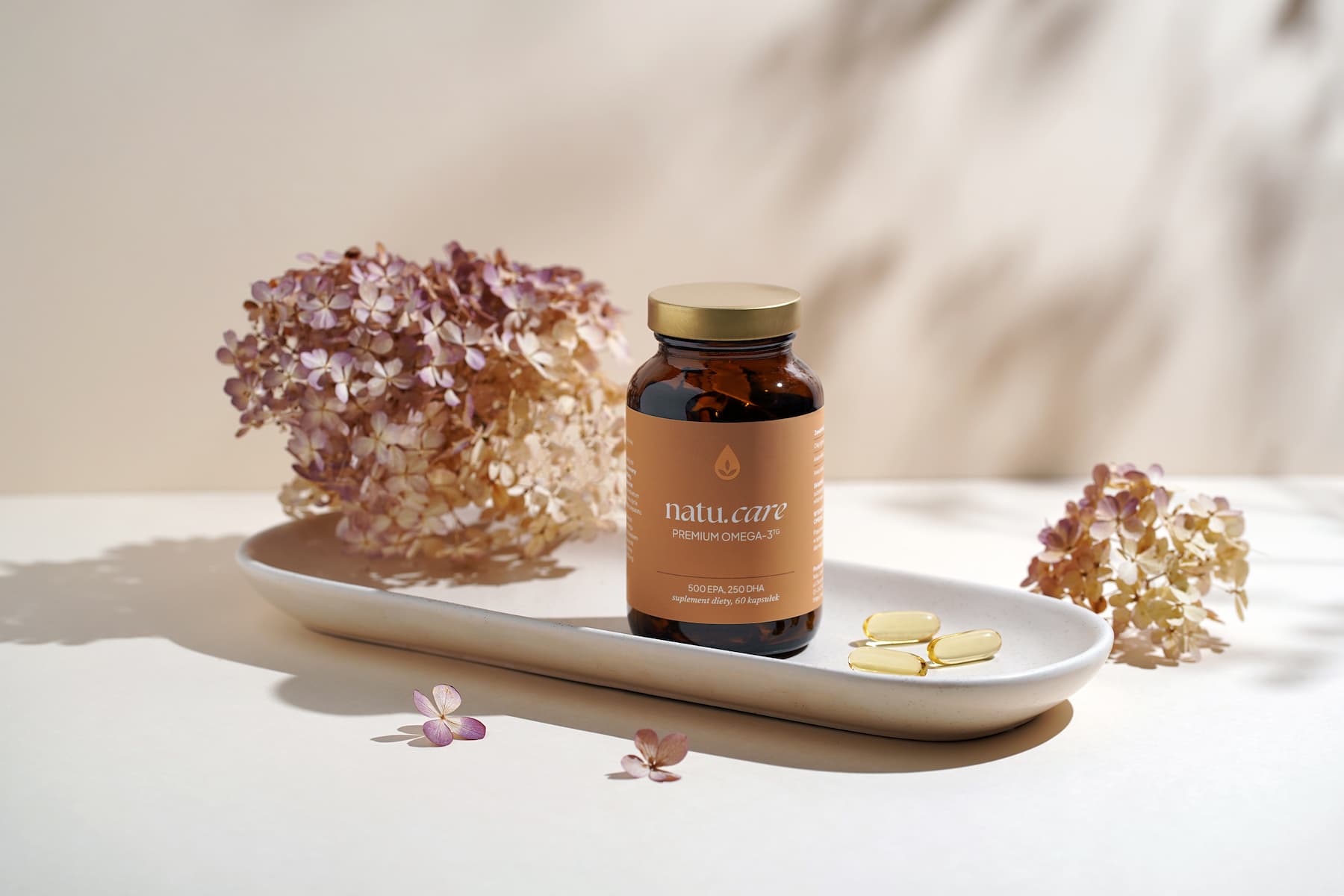
The omega-3 acids from Natu.Care are distinguished by their triglyceride form, which is characterised by high bioavailability.
